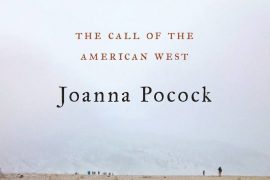To be descended from immigrants, drawn to a vocation of words, and writing from a spiritual lens is to find oneself in a niche within a niche within a niche. And one that I know well. For those with a need to resist labels, it can be daunting to continually peel back one only to find another. Yet far from being distant, it’s these particularities that give the individual voice an expansive resonance. “The immigrant experience is the experience of all of us magnified,” an editor once said to me. And if that’s the case, the spiritual immigrant experience is certainly rich with metaphors and symbols, from exile to war to demons—all appear in both literal and figurative forms throughout this new anthology of Asian American poets.
In The World I Leave You: Asian American Poets on Faith and Spirit, editors Leah Silvieus and Lee Herrick have brought together a wide range of voices from the Asian diaspora in the United States writing on the themes of religion and spirituality. The poems are helpfully grouped into topics on spiritual witness, nature, cultural history and ancestors, political resistance, doubt, and prayer and ritual. The evocative section titles are drawn from lines of some of the poems (as is the book title), followed by more explanatory subtitles. The section dealing with nature, for example, is titled after Brynn Saito’s “Shadow and Release”: “Wanting to Get Clear on Her God-Thinking, She Went Out into That Meadow Again: Locating the Divine in the Natural World.”
But just as interesting are the themes that emerge on their own in the anthology, as though surfacing from a collective consciousness. Memory is one of those recurring themes, whether it’s wrestling with a painful past or mourning a lost identity or history. The speaker in Neil Aitken’s “The Art of Forgetting,” returns to Taipei to realize “Forgetting is in the blood” and his “body relearned Taiwan the hard way.” He prays “for someone to come down to loosen my / tongue, / to unlock that rusted door and let what beats within go free.” In Shireen Madon’s “Religion,” the speaker mourns:
We sold a little of our identity each day
until our bones were bleached of histories
and gurus that had kept us safe. All we can
hope is to be bodied again.
In Hei Kyong Kim’s “Water Mask,” the speaker describes her bicultural identity through the imagery of disguise and birth. She asks, “How do you find memory when you are born from amnesia?” The speaker sits in a bath wearing a facial mask, thinking about her ancestors and how foreign she must appear to them. She must don this “Korean shaman mask of sorts” in order to conjure up her forgotten culture:
I am lost without the mask; no one wants to speak to you because you are ugly
to them, because you can’t find the words to communicate… to connect… to
attach.
Even as this poem is steeped in the imagery of Korean culture—visions of a kayagum (a traditional stringed instrument) and “A halmoni in a white hanbok” (a grandmother in traditional dress)—it echoes also of the biblical story of rebirth. “How can someone be born when they are old?” asks Nicodemus in the book of John, “Surely they cannot enter a second time into their mother’s womb to be born!” For the speaker in “Water Mask,” this impossibility seems the only way. In the bath, she finds herself “drifting in a womb… / inside my mother again, this time without worry of being expelled.”
The foreign words that appear in “Water Mask” above, as well as in many of the poems in this collection, bring up another recurring theme and issue in multicultural writing: that of language, and whether or how much to translate for the reader. Unfamiliarity inevitably elicits demands from readers for explication, and the writer must decide how much is warranted for comprehension without disrupting tone and style. It’s a dilemma that occurs in any topic with specialized terms, and, in addition to language, the poems here inhabit particular cultural, spiritual, religious, political, and historical worlds. Many of the poems do not parse the foreign words and cultural references, instead immersing the reader in the realm of the speaker. Some find ways to weave the explications into the verse, as in Craig Santos Perez’s poems, which include immediate translations scattered throughout. “(Dear Puntan),” for example, begins:
as a patgon : child, I never heard the creation story of our first
mother, fu’una (whose name translates as first), or our first father,
puntan (whose name translates as coconut sapling)…
Note in the above that it’s the English translations that appear in italics, while the native words blend into the regular text, highlighting the switch in perspectives of what is considered foreign.
Sometimes the poems tackle the theme of language and understanding directly. In another of Perez’s poems, “(Dear Fu’una),” the speaker laments,
… i lost
our fino’haya : first
language in transit, ghost
words // who’ll translate
me to you…
And in “On Beauty” by Adeeba Shahid Talukder, a Muslim speaker experiences rejection when she voices the isolation she feels:
if I hadn’t told him:
you’ll never understand, you’re white—
would he orbit me still?
Pervasive throughout the anthology is the overarching theme of spirituality, which is considered here within religious or cultural contexts as diverse as Hinduism, Islam, Buddhism, the natural world, ancient creation myths, folk traditions, as well as Western Christianity—sometimes intermingling with each other. Especially interesting is how many of these poems deal as much with damnation as with salvation or transcendence, and how these states are not relegated to the afterlife.
In Faisal Mohyuddin’s poem, “In Defense of Monsters,” the speaker describes the racist treatment of the Muslim people, portrayed here as living a sort of cursed existence as they are vilified by others:
Let them monster the world’s Muslims, monster our pain
by saying we pay no mind, monster our living hurt
with the phantom aches they’ve fabricated…
when they’ve already monstered us beyond recognition,
we might as well just swallow the pain of being monstered…
The poem’s title is double-edged, defending the speaker being viewed as a monster as well as those who are calling her such, because they are only vilifying themselves.
There is wrestling with doubt in many of the anthology’s poems but also with demons, and often literally. The realm of the living and the dead is sometimes transparent, porous. The speakers can never fully shed the presence of the past and are haunted by the ghosts of ancestors, by memories, and by personal and collective history.
One of the most vivid examples is in Jane Wong’s “After Preparing the Altar, the Ghosts Feast Feverishly.” The speakers in this poem are the ghosts themselves. “Yu choy bolts”—they say—“into roses down here.” Upon waking, the ancestors do not want grub or dirt or mud (that “false chocolate!”). They have specific cravings, and their tastes are as much American as they are Asian, equally delighted by durian, “shrimp chips curling in a porcelain bowl,” and “Meat wool! A bouquet of chicken feet!” as they are by “an omelet loosening its folds like hot Jell-O,” “the marbled fat of steak,” or ants (perhaps on a log) doing the “do-si-do” in “a spoonful of peanut butter.” The ancestors torment the little girl in the poem with their incessant demands, culminating in that final taunt: “Tell us, little girl, are you / hungry, awake, astonished enough?” I was enthralled to discover that Wong’s poem was actually turned into an art installation at the Frye Museum in 2019, composed of, among other artifacts, ancestral altars. In the pictures of the exhibition, I can imagine her audience physically entering into the realm of these persistent ancestors, enveloped in their world even while walking on this one.
I am grateful to this anthology for introducing me to poets I have not yet encountered, including Eugenia Leigh, Jane Wong, and Hei Kyong Kim, whose voices have enriched my own understanding of being a writer informed by a foreign (yet native) and spiritual lens. I appreciate how multiple works by the same poets are strewn across the sections, the voices weaving in and out, as though these poems were speaking to one another as well as to the reader. Whether read by those who identify within the Asian American diaspora or otherwise, The World I Leave You offers many entry points into geography and history, into faith and spirit, and into language and poetry. The voices here are multifaceted yet interconnected, portraying an ever-expanding world into which readers are invited to journey and experience.





